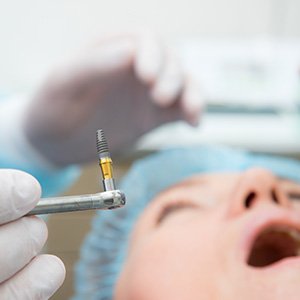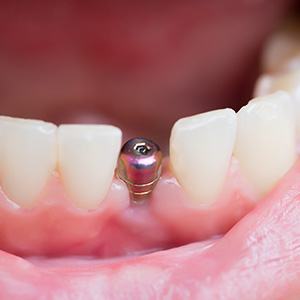Dental Implants — Kerrville, TX
Permanently Replace Your Missing Teeth
Do you have a missing tooth or many missing teeth in your upper or lower arch? A dental implant provides the most permanent, strong, and natural looking restoration. Dr. Butler has experience in placing dental implants in Kerrville, TX. He can give you back your smile with this procedure performed in our Kerrville cosmetic dental office. It’s also an outpatient procedure, so you don’t have to worry about taking a lot of time off work. If you’re ready to permanently replace your missing teeth, give us a call today.

Why Choose Carroll R. Butler, DDS Family Dentistry For Dental Implants?
- Dentist with 26 Years of Experience in Dental Implants
- Dental Implant Placement & Restoration Performed In-House
- Advanced Technology to Enhance Treatment & Improve Results
What Are Dental Implants?

When we talk about dental implants, we’re mainly talking about the titanium post that replaces the root portion of your tooth. While this piece is technically the “implant” portion, dental implants also include a restoration that sits on top and an extension that connects the two components together. Once placed, dental implants have the ability to mimic tooth roots almost exactly, making it possible to chew and smile with confidence for several decades. This is the only tooth replacement option that replaces teeth in this way.
The 4-Step Dental Implant Process

In many cases, dentists ask patients to go to other dental offices to have the surgical portion of their implant procedure completed. This can make the process less convenient, especially for the patient. Since Dr. Butler is an expert in implant dentistry and has been placing and restoring implants for nearly 30 years, he can complete every step of the process under one roof! Not only is it more convenient, but it’s sure to give patients more confidence in the personalization of their care. Continue reading to learn more about the four main steps in the process.
Initial Dental Implant Consultation

At your first appointment, Dr. Butler will review your oral health and medical history to determine if you’re a good candidate for dental implants. Depending on his findings, he may recommend preliminary treatments such as gum disease treatment, tooth extractions, or bone grafting. Once ready, we’ll walk you through each step of your personalized treatment plan, including the timeline and cost, ensuring you have a clear understanding before moving forward.
Dental Implant Surgery

After your consultation, your dental implants will be placed via a minor surgical procedure. This streamlined approach enhances convenience and ensures personalized care. During the procedure, the area is numbed, and a small incision is made in the gums. Dr. Butler will place the dental implant into the bone of your jaw, close the gum, and place a protective cap over the post to aid healing.
Dental Implant Osseointegration & Abutment Placement

Osseointegration is the crucial healing phase where the implant fuses with the jawbone, creating a stable foundation for your restoration. This process typically takes three to six months. Once the implant is securely integrated, Dr. Butler will perform a minor procedure to uncover the implant and place an abutment – a small connector that supports the final restoration. In some cases, both the implant and abutment can be placed in a single visit. While you heal, impressions will be taken to craft your custom restoration.
Delivery of Dental Implant Restorations

The final step is placing your customized restoration! Dr. Butler will ensure your crown, bridge, or denture fits perfectly. He’ll check your bite for comfort and make any necessary adjustments. Once secured, you’ll be ready to enjoy a fully functional, confident smile. With proper care, your dental implants can last a lifetime!
Benefits of Dental Implants

Dental implants are excellent when it comes to replacing teeth. They’re so good, in fact, that dentists place over 500,000 of them yearly! Still, you should learn more about their perks before you commit. Doing so would confirm whether the treatment is right for you. Fortunately, Dr. Butler and the rest of our team can explain the benefits of dental implants in Kerrville. To that end, just keep reading or call our office for all the relevant details!
Day-to-Day Benefits

Chances are you’re eager for implants’ various day-to-day benefits. Well, on that front, they won’t disappoint! The advantages in question include the following:
- A Confident Smile - Being custom-made, implants are enamel-colored and blend seamlessly with the rest of your smile. As a result, they’ll give you a beautiful smile that boosts your confidence and body image.
- Easier Eating - Implants fuse with your jawbone, restoring more of your bite force than dentures or bridges. That means you can use them to eat foods you couldn’t have before!
- Low-Maintenance - Compared to other restorations, implants tend to be low-maintenance. You won’t need to apply various creams, solutions, or adhesives to them. Instead, you can easily clean them with twice-daily brushing and once-daily flossing.
Health Benefits

Over time, you’ll notice that implants don’t just improve everyday life. They also enhance your body’s general health. The most common of these physical upsides are:
- Little-to-no Discomfort - Since bridges and dentures sit on your gums, they sometimes rub mouth tissues and cause aches or sores. In contrast, implants have no such effects due to acting like natural teeth.
- Better Nutrition - By making eating easier (see above), implants allow you to have a more varied diet. The result is that your body gets more of the nutrients it needs to stay fit and healthy.
- Tooth Support - If you don’t fix your smile gaps, your other teeth will tilt and fall out. Implants, though, can fill the spaces so your remaining pearly whites remain straight and secure.
Long-term Benefits

Of course, what really elevates implants are their long-term benefits. Consider the especially notable ones listed below:
- Low Chance of FailureGiven implants’ various features, they rarely fail in the short term. Even now, the treatment’s success rate sits at over 95%!
- Long-Lasting Results - With an average lifespan of 15-20 years, the typical implant can last much longer than a denture or bridge. Even better, implants can last 30 years or more if given proper care.
- Cost-Effective Care - Because implants are both durable and long-lasting, they don’t need frequent replacement. They thus save you more time and money than alternative procedures. This fact puts them at odds with dentures and bridges that need periodic and costly repairs.
Are Dental Implants Right for Me?

If you are self-conscious about missing teeth and don’t want to wear partial or full dentures, a dental implant in Kerrville could be right for you. We can create a dental implant treatment plan that can help complete your smile, whether you’re missing one, several, or all your pearly whites. Plus, if you are not initially a good candidate for dental implants, we may be able to help you become one with preliminary treatments like a bone graft or gum disease therapy.
Missing 1 Tooth

Missing single teeth? One titanium implant can be placed inside of the jaw and given time to heal and integrate with your existing bone tissue. Once the implant has fully healed, we’ll attach the extension portion, wait a few more weeks for the gum tissue to heal, then cover it with a tooth-colored restoration.
Missing Multiple Teeth

To replace multiple missing teeth, we can provide two dental implants to hold one larger dental bridge. In most cases, these dental implants can hold a three or even four-crown bridge. Since the implants are incredibly strong, there’s no need to remove existing tooth enamel, which is required for placing bridges.
Missing All Teeth

Dr. Butler is happy to say that he can replace upper and lower arches of teeth with dental implants. This may include four to six dental implants to hold an entire arch, but this can vary depending on your needs. You should not need a dedicated implant for each tooth you intend to replace.
All-On-4 / Teeth-In-A-Day

If you’d like to walk out of the dental office with a brand-new smile the same day as your implant surgery, you’re in luck! All-on-4 (or Teeth in a Day) is a unique procedure that works to maximize as much of your jaw’s bone tissue as possible. This makes the implants viable for immediate loading, which means a larger dental restoration can be affixed the same day.
Understanding the Cost of Dental Implants

The dental implant procedure has many stages and every patient is going to have their own needs, which is why it can be very difficult to provide a specific price tag for treatment at first. Until we know exactly which teeth need to be replaced, the number of teeth being replaced, and whether or not preparatory treatments are needed beforehand, we can’t provide an exact cost. After we complete the consultation and discuss what the best options are moving forward, then we can confidently provide a price tag for your treatment.
With that said, dental implants are more expensive upfront compared to other options, but the benefits largely justify the cost. This is because in the long-term, you’re far less likely to need to replace dental implants compared to bridges or dentures. Think of dental implants as an investment, especially since they are meant to last 30 years or more once placed and provide benefits that are not possible with other methods.
The Types of Dental Implants

Every patient is unique, which means that every dental implant procedure is unique. Some of the factors that will determine the total cost of your treatment include:
- How many dental implants you need
- The nature of your final restoration
- The specific dental implant techniques used to rebuild your smile
- Whether you require any preliminary treatment (such as extractions or a bone graft)
During your consultation, Dr. Butler will assess your oral health so our team can provide you with a candid estimate for the cost of your implant journey.
The Stages of Dental Implant Treatment

The dental implant process usually takes place across several phases, some of which are weeks or months apart. Each portion of the treatment incurs its own cost, so you will have time between them to plan your budget accordingly. Some of the phases of your dental implant journey may include:
- Your initial consultation
- Preparatory treatment
- Dental implant placement surgery
- Abutment placement
- Design and placement of your final restoration
Are Dental Implants Worth the Investment?

In a word, yes. Dental implants are certainly worth the investment. They provide greater and more benefits than any other type of tooth replacement. For example, they stimulate the jawbone, they provide a remarkably strong bite force, and they look incredibly natural. Plus, their long lifespan may make them a better long-term monetary value than forms of tooth replacement that need to be replaced every few years.
Does My Dental Insurance Cover Dental Implants?

Some dental insurance policies cover implants, while others do not. Even if yours does not, it may still cover part of your preliminary treatment or your final restoration. You will have to check the specifics of your policy to see how it applies. In addition to insurance, financing can be a valuable resource that could help you fit dental implants into your budget. We are happy to accept both CareCredit and Alphaeon financing.
Maintaining & Caring For Your Dental Implants

You’ll need to take regular care of your dental implants if you want them to last for as long as possible, just like your natural teeth. At-home oral hygiene and regular visits to a dentist are incredibly important but so are other day-to-day habits that keep your smile in good condition. You’ll find more of these tips below so you can be fully informed on how to take proper care of your dental implants.
Make Oral Hygiene a Priority

While dental implants can last for decades once placed, you’ll need to make sure you’re practicing regular brushing and flossing every day to keep them and the gum tissue around them clean. Brush twice daily, floss at least once a day, and consider adding an oral rinse to your routine. Make sure this rinse is alcohol-free to prevent dry mouth, a condition that makes it easier for bacteria to produce plaque.
Eat a Healthy Diet

The foods you eat have a much bigger impact on your oral health than you realize. For example, eating large amounts of sugar and starch every day will only make your oral care routine harder. Plaque buildup is more common as a result, putting you at greater risk of gum disease (which in the more serious stages can cause dental implants to fail). Incorporate healthy foods into your meals, such as fruits and vegetables to ensure your mouth is getting the vitamins and minerals it needs to stay healthy.
Break Bad Habits

Your teeth, dental implants or otherwise, are not capable of performing tasks that should be used for a dedicated tool. Using your mouth can cause either natural enamel or your restorations to chip, crack, and erode, especially if you do so regularly. To keep your dental implants intact, have a dedicated tool nearby to perform tasks, whether it’s opening packages or bottles, trimming your fingernails, or opening nuts. If you have a tendency to chew on inanimate objects, try to find a habit to replace it. This could include drinking water, squeezing a stress ball, or going for a walk to destress.
Protect Your Dental Implants

Staying active is important at every age, but you shouldn’t have to put your smile or the rest of your body at risk just to do so. If you participate in activities where the risk for sudden impact is high, wear a custom mouthguard. Additionally, if you have a tendency to grind and clench your teeth while you sleep, get a dedicated nightguard to protect your teeth throughout the night. The last thing you want is to wake up with a cracked tooth or restoration.
Schedule Regular Dental Checkups

Even with the best at-home oral care routine, dental checkups every six months are incredibly important for the long-term health of your dental implants. We’ll want to make sure your tooth replacements are healthy just as much as the rest of your teeth. Plaque and tartar often build up inside your mouth over time, so we’ll make sure to give you a thorough cleaning before you leave. If needed, we can provide additional tips for improving your at-home brushing and flossing.
Dental Implant Post-Op Instructions

Our practice is happy to provide comprehensive dental implant treatment from start to finish, all in one convenient location. After your oral surgery, we encourage you to read through the following post-op instructions to ensure a smooth and speedy recovery. We’re committed to keeping you well-informed so you know what to expect throughout the healing process. If you experience anything unusual or outside of what’s described here, don’t hesitate to reach out for assistance.
What to Do Directly After Dental Implant Surgery

After getting dental implants, it’s crucial to allow the blood clot at the surgical site to remain undisturbed so the gums can heal properly. To promote a successful recovery, avoid:
- Spitting (use tissues or swallow saliva)
- Drinking from straws
- Smoking or using tobacco products
- Touching the surgical site with your fingers or tongue
Common Side-Effects When Recovering from Dental Implant Placement

If you’ve never undergone oral surgery before, it can be difficult to determine which symptoms are normal and which require attention. While some discomfort is expected, it should gradually subside. If your pain worsens or does not improve, contact our office right away. Here are common side effects during the initial recovery period:
- Intermittent Bleeding: Minor bleeding is normal and can be controlled by applying gentle pressure to the gauze placed over the surgical site.
- Swelling: Swelling may persist for up to a week but can be reduced by applying a cold compress to the cheek or jaw for 10-minute intervals.
- General Discomfort: Pain can be managed with prescribed or over-the-counter medication as directed.
Your Diet After Dental Implant Surgery

For the first few days after your dental implant placement, it’s best to stick to soft, non-abrasive foods. Stock up on options like:
- Mashed potatoes
- Yogurt
- Ice cream
- Pudding
- Soup
- Scrambled eggs
- Pasta
You can gradually return to your normal diet as soon as you feel comfortable, but only after your implant dentist in Kerrville confirms it’s safe. In the meantime, avoid hard, crunchy, or chewy foods and refrain from chewing directly on the implant site.
Post-Op Health & Oral Hygiene

Keeping your mouth clean is essential for a smooth healing process. You can resume brushing your teeth the day after surgery but be gentle around the surgical area. Additionally, rinse your mouth two to three times a day with warm salt water, especially after meals. Avoid using mouthwashes that contain high levels of alcohol, such as Scope or Listerine, as they can cause irritation.
What to Do After Your New Teeth Are Attached

Once your implant site has fully healed, it’s time for the final step – attaching your new teeth! During this appointment, we will secure your custom-made crown, bridge, or denture to your dental implants. You may experience slight gum sensitivity initially, but this can be managed with mild pain medication. Since there’s no extensive recovery needed, you’ll be ready to show off your beautifully restored smile the very same day!
Dental Implant FAQs
Will I Have to Take Off Work for Dental Implant Surgery?
Most patients only need to take one or two decay off work to get dental implants. If your job is physically demanding, you may want to take at least three to four days off as heavy exercise can divert blood from the implant site and delay healing. However, every case is different. During your consultation, we will give you a more specific recommendation to meet your needs.
Will People Be Able to Tell That I Have Dental Implants?
Your dental implants and restorations are placed and designed using impressions of your smile. Once you have your dental implants placed, people shouldn’t be able to tell the difference between them and your natural teeth. Dental implants are placed in the jaw like tooth roots, so you don’t need to keep your jaw in a strange position to keep your replacement teeth in place like you would for ill-fitting dentures. They will be secure in place.
Do Dental Implants Decay?
No, it is impossible for your dental implant or restoration to decay because they are not made from enamel. However, your remaining natural teeth are still susceptible to cavities and your gums can still become infected. It is as important as ever to continue keeping up an excellent oral hygiene routine. You should also continue to see your dentist every six months for regular cleanings and checkups. During this time, your dentist will also keep an eye on your dental implants to ensure that everything looks as it should.
Can I Get Dental Implants If I Have Gone Through Cancer Treatment?
Patients who have undergone radiation therapy in the head and neck may be at higher risk for dental implant failure, even if it occurred a long time ago. However, if you had radiation therapy in a place far away from your mouth, you may not be at increased risk. You should speak with your oncologist and dentist to determine whether or not you are a good dental implant candidate as well as possible ways to avoid the risks involved.
I Need a Checkup & Cleaning I Need a Dentist for My Child I am Concerned About Bleeding Gums I Need Full Mouth Rehabilitation I Have a Cavity or Broken Tooth I am Missing One or More Teeth I am in Pain and Need Help I Want to Enhance My Smile I am Anxious/Afraid of the Dentist View Our Services

